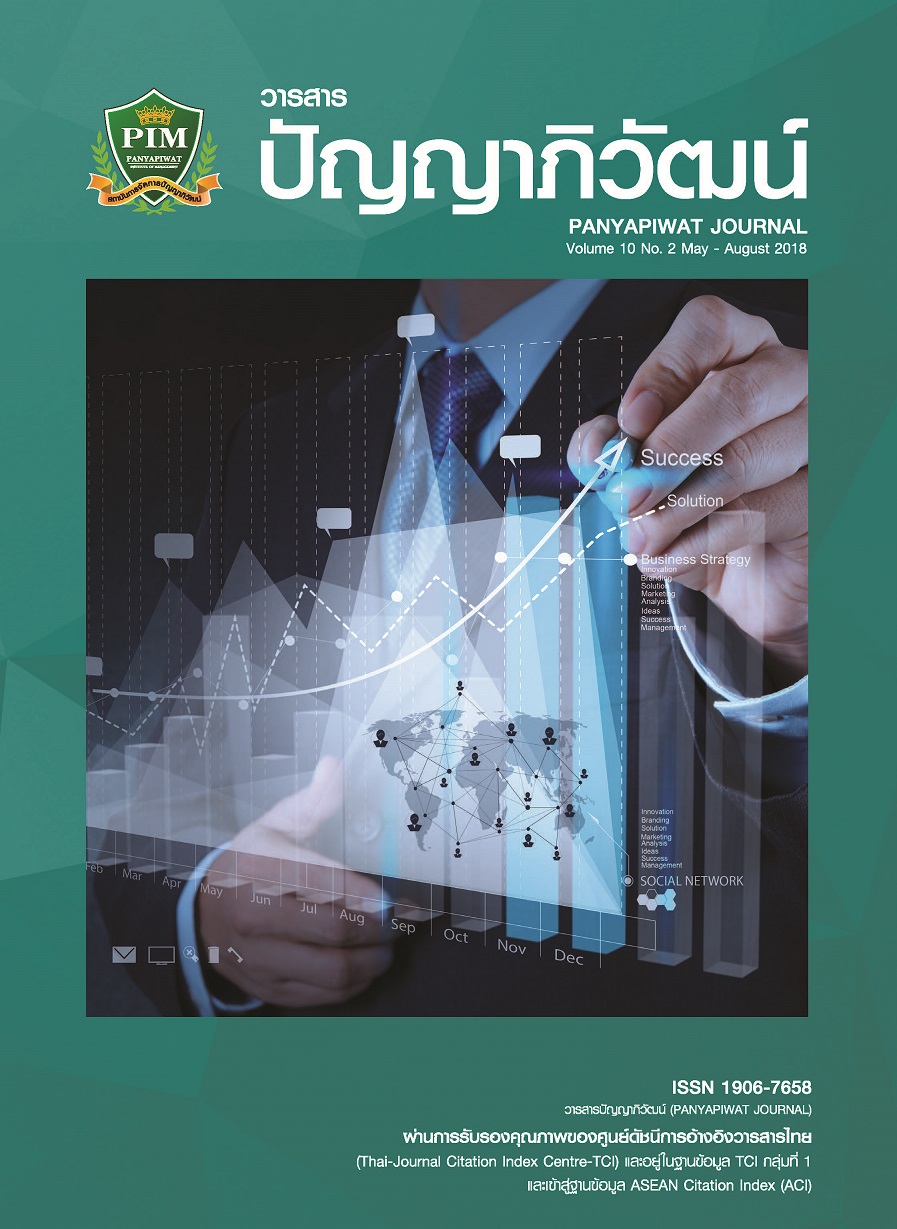การศึกษาความรู้ร่วมเกี่ยวกับคำศัพท์เฉพาะทางด้านภาษาศาสตร์ของอาจารย์และนักศึกษา ในรายวิชาการเขียนภาษาอังกฤษ
Main Article Content
บทคัดย่อ
การศึกษาครั้งนี้เปรียบเทียบความคาดหวังของผู้สอนกับการรับรู้ของนักศึกษาเกี่ยวกับคำศัพท์เฉพาะทางด้านภาษาศาสตร์ในรายวิชาการเขียน ผู้วิจัยได้รวบรวมคำศัพท์ภาษาศาสตร์ที่พบบ่อยในเอกสารประกอบการเรียนการสอนรายวิชาที่ศึกษาและบรรจุในแบบสอบถามจำนวน 50 คำ การวิเคราะห์ข้อมูลจากแบบสอบถามแบ่งออกเป็น 3 ด้านหลักคือ การเปรียบเทียบความคาดหวังของผู้สอนเกี่ยวกับความรู้ของผู้เรียนต่อคำศัพท์ ความรู้ที่แท้จริงของผู้เรียนและการใช้คำศัพท์เหล่านั้นในชั้นเรียน ผลการวิจัยพบว่า ผู้สอนมีการใช้คำศัพท์เฉพาะทางด้านภาษาศาสตร์บ่อยครั้งในชั้นเรียน ข้อมูลจากการวิเคราะห์แบบสอบถามของผู้เรียนพบว่า นักศึกษามีความรู้ความเข้าใจเกี่ยวกับคำศัพท์บางส่วน อย่างไรก็ตามยังมีคำศัพท์อีกบางส่วนซึ่งมีโครงสร้างที่ซับซ้อนที่นักศึกษายังไม่ได้ให้คำอธิบายหรือแสดงตัวอย่าง ซึ่งผลจากการศึกษาแสดงให้เห็นว่า นักศึกษายังขาดความรู้ที่เพียงพอเกี่ยวกับคำเฉพาะทางในรายวิชาการเขียน อ้างอิงจากผลการศึกษาในครั้งนี้ผู้วิจัยได้เสนอแนะแนวทางการจัดการเรียนการสอนรายวิชาการเขียนในบริบทการสอนภาษาอังกฤษเป็นภาษาต่างประเทศและแนวทางการศึกษาวิจัยในครั้งต่อไป
Article Details
“ข้าพเจ้าและผู้เขียนร่วม (ถ้ามี) ขอรับรองว่า บทความที่เสนอมานี้ยังไม่เคยได้รับการตีพิมพ์และไม่ได้อยู่ระหว่างกระบวนการพิจารณาลงตีพิมพ์ในวารสารหรือแหล่งเผยแพร่อื่นใด ข้าพเจ้าและผู้เขียนร่วมยอมรับหลักเกณฑ์การพิจารณาต้นฉบับ ทั้งยินยอมให้กองบรรณาธิการมีสิทธิ์พิจารณาและตรวจแก้ต้นฉบับได้ตามที่เห็นสมควร พร้อมนี้ขอมอบลิขสิทธิ์บทความที่ได้รับการตีพิมพ์ให้แก่สถาบันการจัดการปัญญาภิวัฒน์หากมีการฟ้องร้องเรื่องการละเมิดลิขสิทธิ์เกี่ยวกับภาพ กราฟ ข้อความส่วนใดส่วนหนึ่งและ/หรือข้อคิดเห็นที่ปรากฏในบทความข้าพเจ้าและผู้เขียนร่วมยินยอมรับผิดชอบแต่เพียงฝ่ายเดียว”
เอกสารอ้างอิง
Alipour, S. (2014). Metalinguistic and linguistic knowledge in foreign language learners. Theory and Practice in Language Studies, 4(12), 2,640-2,645.
Berry, R. (2014). Investigating language awareness: The role of terminology. Second Language Learning and Teaching, 21-33.
Caudery, T. (1995). What the “process approach” means to practicing teachers of second language writing skills. Retrieved October 1, 2014, from https://www.tesl-ej.org/wordpress/issues/volume1/ej04/ej04a3/
Changpueng, P. & Wasanasomsithi, P. (2009). A genre-based English writing lesson for Thai undergraduate engineering students. The New English teacher, 3(1/2), 34-56.
DeKayser, R. (2009). Cognitive- psychological processes in second language learning. In Long, M. H. & Doughty, C. J. (eds.). The handbook of language teaching. Wiley-Blackwell, Malden, MA, 119-138.
Ellis, M. (2016). Metalanguage and a component of the communicative classroom. Accent Asia, 8(2), 143-153.
Ellis, R. (2004). The definition and measurement of L2 explicit knowledge. Language Learning, 54,227-275.
Foley, J. (2005). English...in Thailand. RELC Journal, 36(2), 223-234.
Garrett, N. (1986). The problem with grammar: What kind can the language learner use? The Modern Language Journal, 70(2), 133-148.
Hu, G. (2011). Metalinguistic knowledge, metalanguage, and the relationship in L2 learners. System, 39(1), 63-77.
Katip, A. (2009). An exploratory study of sentence structure instruction in improving Chulalongkorn University Law students’ writing ability. PASAA, 43, 43-50.
Kulprasit, W. & Chiramanee, T. (2013). Using journal writing with peer feedback to enhance EFL students’ writing ability across proficiency levels. PASAA, 45, 91-112.
Nagy, W. & Anderson, R. (1995). Metalinguistic awareness and literacy acquisition in different languages. Technical Report. No. 618, Centre for the Study of reading, College of Education, University of Illinois at Urbana- Champaign, U.S.A.
Nuangpolnak, A. (2012). The use of multilevel writing tasks in an EFL classroom. PASAA, 44, 39-44.
Piriyasilpa, Y. (2012). Teaching ‘periodicity’ in an EFL writing class to help students develop ideas from paragraph to text: A classroom case study. Journal of Linguistics and the Human Sciences, 8(1), 91-121.
Piriyasilpa, Y. (2016). Review of the SFL genre-based approach in a Thai tertiary context. The New English Teacher, 10(2), 67-88.Piriyasilpa, Y., Noipa, J. & Pandet, W. (2009). Using Grammar Clinic to support students in learning the ‘English for Study Skills Development’ Course. Proceedings of the 25th international conference, Taksin University: Research adds value leading to economy and education advancement and sustainability of Thai society, 21-24 May, 2014.
Roehr, K. (2007). Metalinguistic knowledge and language ability in university-level 2 learners. Applied Linguistics, 29(2), 173-199.
Roshan, A. & Elhami, A. (2016). The effect of metalanguage on grammar noticing of the Iranian EFL learners. International Journal of English Linguistics, 6(3), 194-199.
Salteh, M. A. & Sadeghi, K. (2015). Teachers’ and students’ attitudes toward error correction in L2 writing. The Journal of Asia TEFL, 12(3), 1-31.
Schleppegrell, J. M. (2013). The role of metalanguage in supporting academic language development. Language Learning, 63(1), 153-170.
Seetrakarn, Y. (2017). Teacher perceptions and course development. Journal of Humanities and Social Sciences, Burapha University, 25(47), 243-265.
Sermsook, K., Liamnimitr, J. & Pochakorn, R. (2017). An analysis of errors in written English sentences: A case study of Thai EFL students. English Language Teaching, 10(3), 101-110.
Tokunaka, M. (2014). Exploring metalinguistic knowledge of low to intermediate proficiency EFL students in Japan. Retrieved October 31, 2016, from https://journals.sagepub.com/doi/pdf/10.1177/2158244014553601
Turnball, B. (2017). Learner perspectives on national identity and EFL education in Japan: Report of a questionnaire study. The Journal of Asia TEFL, 14(2), 228-243.
Wang, C. (2017). Two affective varieties and language learners’ perceptions of classroom interaction. The Journal of Asia TEFL, 14(1), 16-31.
Zipke, M. (2007). The role of metalinguistic awareness in the reading of sixth and seventh grades. Reading Psychology, 28, 375-396.


